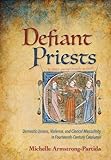Defiant Priests : Domestic Unions, Violence, and Clerical Masculinity in Fourteenth-Century Catalunya / Michelle Armstrong-Partida.
Material type: TextPublisher: Ithaca, NY : Cornell University Press, [2017]Copyright date: ©2017Description: 1 online resource (366 p.)Content type:
TextPublisher: Ithaca, NY : Cornell University Press, [2017]Copyright date: ©2017Description: 1 online resource (366 p.)Content type: - 9781501707827
- Marriage -- Religious aspects -- Catholic Church -- History -- To 1500
- Marriage -- Spain -- Catalonia -- History -- To 1500
- Masculinity -- Religious aspects -- Catholic Church -- History -- To 1500
- Masculinity -- Spain -- Catalonia -- History -- To 1500
- Medieval & Renaissance Studies
- Religious Studies
- Spain
- HISTORY / Medieval
- Masculinity, Medieval Iberia, Sexuality, Violence, Priests
- 262.142467 23
- BX1912.9 .A76 2018
- online - DeGruyter
| Item type | Current library | Call number | URL | Status | Notes | Barcode | |
|---|---|---|---|---|---|---|---|
 eBook
eBook
|
Biblioteca "Angelicum" Pont. Univ. S.Tommaso d'Aquino Nuvola online | online - DeGruyter (Browse shelf(Opens below)) | Online access | Not for loan (Accesso limitato) | Accesso per gli utenti autorizzati / Access for authorized users | (dgr)9781501707827 |
Frontmatter -- Contents -- Acknowledgments -- Archival Abbreviations -- Notes on Names and Titles of Benefices -- Introduction: Understanding Priestly Masculinity -- 1. Marriage Defines the Parish Priest -- 2. Proof of Manhood: Priests as Husbands and Fathers -- 3. Laymen in Priestly Robes -- 4. “Quarrelsome” Men: Violence and Clerical Masculinity -- 5. Becoming a Priest: Clerical Role Models and Clerics-in- Training -- 6. Hierarchy, Competition, and Conflict: The Parish as a Battleground -- Conclusion -- Appendix -- Bibliography -- Index
restricted access online access with authorization star
http://purl.org/coar/access_right/c_16ec
Two hundred years after canon law prohibited clerical marriage, parish priests in the late medieval period continued to form unions with women that were marriage all but in name. In Defiant Priests, Michelle Armstrong-Partida uses evidence from extraordinary archives in four Catalan dioceses to show that maintaining a family with a domestic partner was not only a custom entrenched in Catalan clerical culture but also an essential component of priestly masculine identity.From unpublished episcopal visitation records and internal diocesan documents (including notarial registers, bishops' letters, dispensations for illegitimate birth, and episcopal court records), Armstrong-Partida reconstructs the personal lives and careers of Catalan parish priests to better understand the professional identity and masculinity of churchmen who made up the proletariat of the largest institution across Europe. These untapped sources reveal the extent to which parish clergy were embedded in their communities, particularly their kinship ties to villagers and their often contentious interactions with male parishioners and clerical colleagues. Defiant Priests highlights a clerical culture that embraced violence to resolve disputes and seek revenge, to intimidate other men, and to maintain their status and authority in the community.
Mode of access: Internet via World Wide Web.
In English.
Description based on online resource; title from PDF title page (publisher's Web site, viewed 26. Apr 2024)


